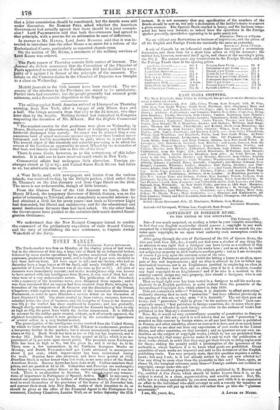COPYRIGHT IN FOREIGN MUSIC.
TO THE EDITOR OF THE SPECTATOR.
17th February 1841.
Sm—I was much surprised, on reading a letter in your valuable.miscellany, to find that ally English musicseller should assume a copyright in any work composed by a foreigner residing abroad ; and I was induced to search the sta- tutes upon copyright, to see upon what authority such assumptinn could be grounded. After going through the acts of Parliament of the 8th of Queen Anne, the 41st and 54th Geo. III., &c., 1 could not find even a shadow of any thing like an allusion to any right that a foreigner can have (even as a resident in this country) to an exclusive copyright in his works here ; and as an alien, he could not assign any property in such works to another party : but as I am no lawyer, of course I go only upon the common sense of the case. Our acts of Parliament positively forbid the letting a house to an alien, upon pain of fine and imprisonment ; and no alien is allowed by law to follow any mechanical business, nor is an Englishman justified in employing an alien in any such business ; how then can an alien, even if he is a resident, transfer any legal copyright to an Englishman ? and if he who is a resident in this country cannot assign any such property, how should a foreigner, who is not a resident, be able to do so ?
That no legal right ever has been vested in a foreigner to sell his works ex- clusively to an English publisher, is quite evident from the preamble of the International Copyright Act, which passed in July 1838.
This aet commences with—" Whereas, it is desirable to afford protection," evidently showing that no such " protection " had been afforded previously to the passing of this act, or why state "it is desirable." The act then goes on to say, that " protection " shall be given "to the authors of books" (and con- sequently music) "first published in foreign countries, &c. in cases where pro- tection shall be afforded in such foreign countries to the authors of books first published in her Majesty's dominions."
Now, Sir, it wants no very extraordinary quantity of penetration to discover the meaning of this act ; and it is well known that no such "protection" is awarded to this country by foreign states, as all our best literature is published in France, and other countries, almost as soon as it is here, and at so much lower a price that we are shut out from any exportation of new works to the United States, and other countries, on that account ; and so ignorant are our own au- thorities on the subject of copyright works, (which by law are prohibited from being imported,) that many persons make it a rule to wait the publication of these works abroad, in order that they mayget their friends to bring copies over for them ; risking the penalty under a presumption of the ignorance of the authoritits, whose business it is to know what goods are prohibited. Great quantities of such works are imported and sold tothe detriment of the English publishing trade. You very properly state, that this question requires a settle- ment; but may I ask, is it not already settled by the act now alluded to ? Can any thing be more clear than the preamble to this act ? Then, again, at clause 14, the marginal reference reads thus—. Foreign authors not entitled to copyright, except under this act."
There is an excellent pamphlet on this subject, published by T. BOOSEY and Co., entitled A Few Facts, which should be better known than it is, as the subject is stated in a clear, argumentative, and sensible manner. But, Sir, while law is a thing undefinable by common sense, and while it is so expensive an affair to the individual who shall attempt to seek a remedy for injustice at its bands, fersons will put up with the evil rather than go into the "glorious uncertainty.'


























 Previous page
Previous page